People tend to forget that the word “history” contains the word “story”. ~ Ken Burns
For me, the most seductive historians, whether they teach, write essays or books, or make films, are masterful storytellers. They do not forget individual narratives are the breath of the past. Just as life needs each inhale and exhale, even those that go unnoted, history lives because of each story, even—especially—those that have gone untold.
The common story is 1+1=2. The real genuine stories are about 1+1=3. That thing that matters most is more than the sum of its parts. ~ Ken Burns
Venturing off the beaten path is what creativity thrives on. Going beneath, behind, beyond the obvious is what makes history vital rather than static. Something is missing when it’s defined as 1+1=2, leaving out the imagination to expand the equation. Ken Burns is right; the thing that matters most is missing. Unless the door is kept open to fresh interpretation, history loses its chance to other views, to tell the untold, to add up into more than the sum of its parts. Teaching, writing, making films about history are not just about keeping it alive but letting it live to its fully fleshed out potential.
History is malleable. A new cache of diaries can shed new light, and archeological evidence can challenge our popular assumptions. ~ Ken Burns
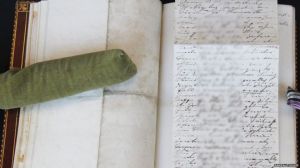
Unpublished manuscripts by Charlotte Bronte recently discovered inside a rare book belonging to her mother.
Imagination, curiosity, obsession can shed new light. New diaries and archeological evidence aren’t found by those who are satisfied with what has been discovered, decided, and, worse, decreed to be true. Surely, even for the historian, absolutes are questionably so, because they rarely tell the whole truth but, instead, slam the door on possibility.
Uncertainty is more essential to exploration than certainty.
With enormous respect and endless gratitude for the investigation, dedication, passion for a subject, and expertise of historians (I couldn’t do what I do without them), I feel that in many ways the best historical fiction writers are reflections of the most creative of their nonfiction brethren. They start similarly from interest and instinct, and are driven to take their interest and instinct on a journey, often a long one, that satisfies their need to explore and discover, their hope of getting lost to find the way, their expectation of being surprised, and their compulsion of making something new out of something old.
Truth, we hope, is a byproduct of the best of our stories, and yet there are many many different kinds of truth. ~ Ken Burns
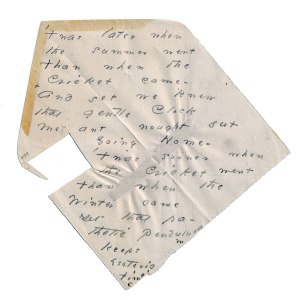
Twas Later When the Summer Went by Emily Dickinson
The kind of truth I look for when writing historical fiction is often found in the little things – The Gorgeous Nothings, as a book of Emily Dickinson’s complete envelope writings in facsimile is titled. They take one intimately into the life of a historical person. As I heard the American historian Doris Kearns Goodwin recently say (not quoting her verbatim): letters and diaries even as they speak of current events often let us into the deepest feelings and thoughts of their authors. Insight and inspiration can come from objects, activities, habits, gestures, all manner of seemingly insignificant things. Somehow they excite me more than epic occurrences. Currently, I’m working on a fiction about Anne Brontë and a wealth of “gorgeous nothings” are not only illuminating her outer world, but offering me a deeper understanding of her inner one. Small things are making the story I’m telling about her so much larger than I initially thought it would be.
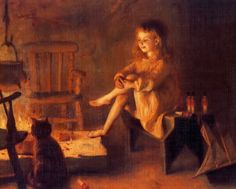
Art Print c19th Victorian Barefoot Farm Girl Sits Fireside Fireplace w Cat
I could hear her sigh of relief when I read of her habit of sitting in a rocking chair and propping her feet on the hearth fender in the parlor at Haworth Parsonage—it offered me a glimpse of her ease in her home environment and set the scene for a whole chapter. As a child, answering her aunt’s chastising “where are your feet, Anne?” with a cheeky “on the ground, Aunt”, showed me a girl—who grew into a woman—as spirited as she was dutiful. A diary entry by Emily describing her and Anne’s lazy start to the day offers the reminder that normalcy was as much a part of their lives as drama and tragedy and shows their home, so often depicted holding them in dismal isolation, as a playful everyday place: “It is past Twelve o’clock {sic} Anne and I have not tidied ourselves, done our bedwork or done our lessons and we want to go out to play …”
A seemingly trivial incident revealed much about Roger North, a historical character featured in my novel To A Strange Somewhere Fled. In his book Notes of Me he describes the effect entertaining “30 gentlemen” at Wroxton had on him by the end of the evening, revealing his reserve in the extreme when he was forced into pretentious social activity: “I made my way like a wounded deer, to a shady moist place, laid me downe {sic}, all on fire as I thought myself, on the ground; and there evapourated [sic] for 4 or 5 hours, and then rose very sick, and scarce recovered in some days.” (I know the feeling!)
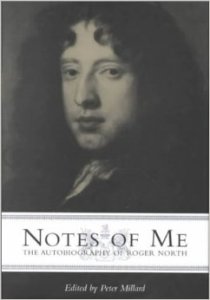
His reflection on which instrument was best for women to play was another delicious morsel of insight into him as man who liked a certain amount of order, as well as modesty in women: “…the harpsichord for ladies rather than the lute; one reason is it keeps their body in a better posture than the other, which tends to make them crooked.”
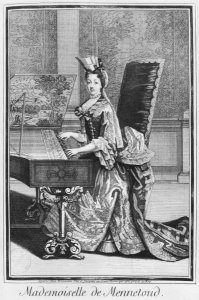
Nicole Kipar 1688
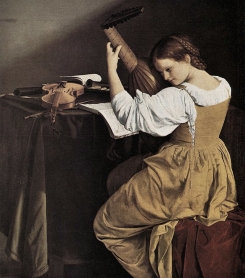
Orazio Gentileschi 1625
(The) history of private men’s lives (is) more profitable than state history. ~ Roger North
It was a list of Alessandro Stradella’s possessions at the time of his death that gave me a starting point for my novel A House Near Luccoli and the fictional Donatella a way to become personally acquainted with him before he physically came into her life (the latter an advantage she had over me), revealing a man who loved beautiful things and yet hinting at a roughness around the edges (and possibly a self-penance for his misdeeds?) through the anomaly of the hemp and wool bedding on the list of silver and gold and diamonds and silk.
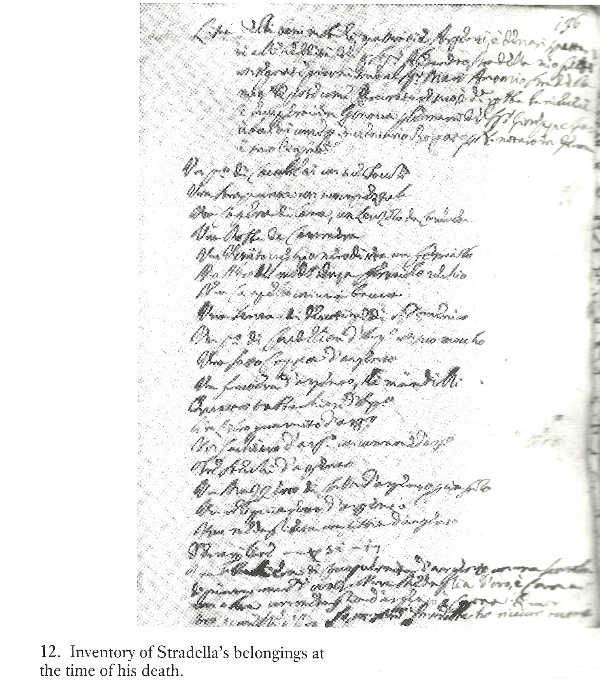
With no portraits or descriptions of Stradella’s physical appearance, almost nothing recorded of his personality, I found him in the paradox between the masterpieces and messes he made. Additionally, I listened for him in the music he composed and saw something of his grace and nobility, but, also, his flair and pride (and over-confidence?) in his signature.

I’m often “delayed” in my writing by always looking for more magnificently mundane things. I can’t help myself. I’m more fascinated by the focused rather than panoramic view, squinting my literary eyes to see into shadows; and risk remaining in them myself.
I also realize that for a writer to enter completely into a story, to offer much more than 1+1=2, there must be a goal–at least a goal–to leave no stone unturned.
As a historian, what I trust is my ability to take a mass of information and tell a story shaped around it. ~ Doris Kearns Goodwin
As an author of historical fiction, I can say the same. Perhaps, I will be an unadulterated historian in my next life. As long as I can be an accomplished musician, too!
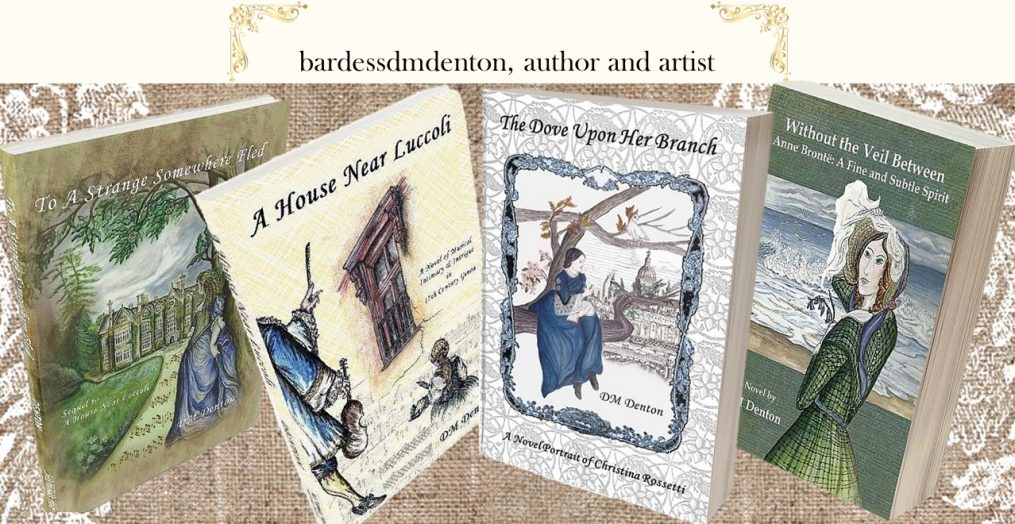
Pingback: My Gift to You: A Story of Sacrifice and Pure Intent | bardessdmdenton – author- artist
Just this, my dear: fabulous post!
Oh, and countless Christmas joys and a superb year in 2016 to you and your mother!
xoxo,
K
LikeLiked by 1 person
Thank you so much, Kathryn! Hope your Christmas was lovely. Wishing many blessings to you and yours in 2016! XO ❤
LikeLike
Looking forward to your “Anne Bronte”, Diane. History was my favourite subject at school, not that I was any good at it (or any other subject) but it always fascinated me and still does.
LikeLiked by 1 person
Thank you, Martin! I’m really enjoying writing it. The research takes me on divergent paths sometimes, and so slows me down. But slow and steady … Hope you are well. Blessings to you and yours at this holiday season, the New Year and far beyond. XO
LikeLiked by 1 person
Thanks, Diane. I’m not a Christmas person but thanks 🙂 Hope all is well with you and hope you remember to take a break from writing and have a bit of holiday too 🙂 x
LikeLiked by 1 person
Well, blessings for the Winter Solstice! Hope you enjoy some relaxing time, too. Peace and light and love. XO
LikeLike
Excellent post. Loving the images as well 🙂
LikeLiked by 1 person
Thank you so much, Christoph! Blessings to you and yours for this holiday season and the New Year!
LikeLiked by 1 person
What a lovely blog! Thank you so much for sharing it with us.
LikeLike
Thank you so much, Deb! And for following this blog. Blessings to you and yours at this holiday season and throughout the New Year.
LikeLiked by 1 person
I loved reading this post and found myself nodding away after each sentence and paragraph because I believe so much in what you say, and that appetite for the revealing detail or habit informs my own writing
LikeLiked by 1 person
Thank you so much, Peter. So glad you enjoyed it. Your own writing is so excellent because of its attention to and creativity with details … they really peel back the layers of any story, don’t they? Blessings to you and yours at this holiday season!
LikeLike
I always love these insights into your writing processes, Diane. All the small details you pick up on are so interesting – this post is a fascinating read. Above all, I can’t wait for your take on Anne Brontë. I somehow suspected it would end up longer than you originally planned (I’m glad about that, by the way :)) xx
LikeLiked by 1 person
Thank you so much, Deborah! Yes, what started out to be a novelette to go with a couple of others into a published volume is going to be a least a novella and at most a shorter length novel (possibly just a little shorter than A House … and To A Strange … So, if all goes according to the new plan, it will be the first in a series of publications about obscure women writers. Hope to have it finished sometime in the spring. As always, thank you for your love and encouragement. It means the world to me. Blessings to you and yours for the holiday season, the New Year and far beyond! XO ❤
LikeLiked by 1 person
Also, considering adding some black and white illustrations to it. 🙂
LikeLike
Diane,
You make me want to get to know Anne better. You closing comment me smile and nod my head:
“Perhaps, I will be an unadulterated historian in my next life. As long as I can be an accomplished musician, too!”
If anyone can accomplish such a grand feat, it would be you! You are multi-talented. It is always a joy to come across your work, no matter the genre.
Hugs,
Sarah
LikeLiked by 1 person
Thank you so much, Sarah, for your visit, taking the time to read, and your lovely comment. Anne Bronte has been off to side for so long, and, because of that, misunderstood in many ways. Of course, it’s impossible to write about one Bronte without getting in touch with them all. This story was going to be one of three to go to be included in one publication. Now it looks like it’s going to stand alone as a novella or even a full-length, if not LONG length, novel. Thank you as always for your support and encouragement and dear friendship. You always bring a warm glow to my heart and spirit. Blessings for the holidays and New Year to you and yours. Much love and hugs. XO ❤
LikeLike
Diane,
Thank you for your kind words and always a huge thanks for the joy of your work.
Wishing you and yours a very Merry Christmas and a bountiful blessings for the New Year.
Love,
Sarah
LikeLike